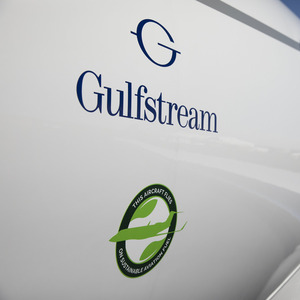Gulfstream extends contract for sustainable aviation fuel

September 24, 2020
BY Gulfstream Aerospace Corp.
Gulfstream Aerospace Corp. on Sept. 14 announced it has extended its contract with World Fuel Services to continue providing the business-jet manufacturer with a steady supply of sustainable aviation fuel (SAF) produced by World Energy.
Gulfstream President Mark Burns announced the deal today during the Virtual 2020 Business Aviation Sustainability Summit to discuss pathways to accelerate the market for SAF. Per gallon, SAF has at least a 60 percent smaller carbon footprint than conventional jet fuel on a lifecycle basis.
This contract extends Gulfstream’s original multiyear purchase agreement, which was the first of its kind in business aviation when it was signed in 2015. Since March 2016, Gulfstream has used SAF for its Savannah-based fleet, which comprises corporate, demonstration, completion, Customer Support and flight test aircraft. The company has made more than 650 flights with an SAF-JET A fuel blend, flying more than 1.3 million nautical miles and reducing carbon dioxide emissions by approximately 1,700 metric tons.
Advertisement
Advertisement
“This renewal marks another step in our ongoing commitment to promoting positive change in our industry,” said Mark Burns, president, Gulfstream. “Reducing our impact on the environment by using SAF is a move we all should consider making. Creating a sustainable future for aviation is a responsibility we share, and we appreciate the leadership, innovation and collaboration of World Energy in helping Gulfstream — and the industry at large — fulfill that responsibility.”
Gulfstream’s sustainability strategy helps support industry goals established by the National Business Aviation Association, the General Aviation Manufacturers Association and the International Business Aviation Council. The goals are a 50 percent reduction in carbon dioxide emissions by 2050 relative to 2005 levels; a 2 percent improvement in fuel-efficiency per year from 2010 to 2020; and carbon-neutral growth from 2020 onward.
Advertisement
Advertisement
The renewable fuel used by Gulfstream is produced by World Energy at its refinery in Paramount, California, from a feedstock of agricultural waste, fats and oils. Fuel and aviation services provider World Fuel Services manages the logistics, including distribution of SAF to Gulfstream on both U.S. coasts. In addition to using the 30/70 blend of low-carbon, drop-in SAF at its Savannah headquarters, Gulfstream makes it available for customers at its Van Nuys and Long Beach, California, service centers. SAF is the only fuel on-site at Gulfstream Long Beach, which also uses it for completions and delivery flights.
“The innovative partnership between Gulfstream and World Energy paved the way for a larger sustainability movement,” Burns said. “For almost a decade, we have leveraged our collaboration with World Energy to increase awareness and availability of SAF around the world. We look forward to continuing that work.”
Related Stories
Broco Energy on July 17 announced a new partnership with the Massachusetts Port Authority (Massport) to deliver and transition Massport's fuel tanks to renewable diesel across its various facilities.
Shell Aviation, Accenture, and Amex GBT on July 10 announced Avelia is in the process of evolving to an industry solution with independent data hosting and a multi-supplier model helping users access the GHG benefits of SAF.
The U.S EPA on July 17 released data showing more than 1.9 billion RINs were generated under the RFS during June, down 11% when compared to the same month of last year. Total RIN generation for the first half of 2025 reached 11.17 billion.
The U.S. EPA on July 17 published updated small refinery exemption (SRE) data, reporting that six new SRE petitions have been filed under the RFS during the past month. A total of 195 SRE petitions are now pending.
European biodiesel producer Greenergy on July 10 confirmed plans to shut down its biodiesel plant in Immingham, Lincolnshire, U.K. The company temporarily suspended operations at the facility earlier this year.
Upcoming Events










